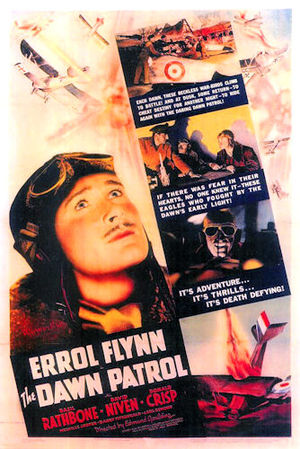
DAWN PATROL
US, 1938, 108 minutes, Black and white.
Errol Flynn, Basil Rathbone, David Niven, Donald Crisp, Melville Cooper, Barry Fitzgerald.
Directed by Edmund Goulding.
The Dawn Patrol is quite an effective war film. Made just prior to World War Two, It reflects the memories of the first world war and echoes such films as Hell's Angels, The Eagle and the Hawk, Journey's End, Wings. Aces High would be something of a seventies equivalent.
Edmund Goulding, who made such films as Grand Hotel, Dark Victory, The Great Lie, directs and is served well by Errol Flynn as the main star. There is a desperate heroism and anti-war tone about this memory of World War One. It is a re-make of a 1930 film of Howard Hawks and uses some of the came aerial footage. Errol Flynn is his usual self in the central role. The foil and dramatic contrast is with Basil Rathbone. David Niven has one of his earliest stiff-upper-lip supporting roles. (This kind of film was partly satirized in the trailer inserted into the middle of Stanley Donen's 1978 Movie Movie.)
1. The First World War and its impact, in cinema tradition? A view of World War I prior to the second?
2. The atmosphere of Hollywood heroics and audience enjoyment and acceptance of these? The tradition of World War I and aviation films, 'Wings, the earlier version of this story?
3. Audience fascination with the air fighting in World War I? Why the impact? The planes themselves, the pilots, the personal combat, the air of reality and unreality with chivalry and achievement? Pioneer aviation? How well did the air sequences embody this?
4. How satisfying was the film as adventure? The people in war, crises, battles, daring, risks?
5. The film as a war film for and against? The tensions of war, the ever present reality of death, games and letting off steam, drinking, heroics? How well did the film blend the adventure and the war themes? What was the final message of the film?
6. The focus on a single station in France? A microcosm of World War I? The centre itself, the town, the surroundings, the fields and the landscapes of France and war? How authentic? how real the battles and the strategies?
7. The emphasis on pressures of Commanders? The characterization of Brand, his decisions, his cracking, his nervous manner, his assistant and his reassurance?
8. Brand and his nerves and seeing conspiracies and plots especially as regards Courtney and his leadership, his irritation with Courtney saying "Right"? his irritation with Scott and the way that the men let off steam? His desire to have a spirit about his corps? His reaction to the deaths of so many young men and so constantly? How serious were the themes of war and death as focused on Brand and his assistant?
9. The contrast with Courtney and Scott and their comic book style heroics? Errol Flynn and David Niven as embodying this style for Hollywood adventurer? Courtney and Scott as persons, their leadership, joking even after death? The importance of the sequence of the capture of the German pilot and treating him as one of the comrades? The equalizing of war?
10. The theme of the replacements and deaths? Brand and his nervous cracking, his manoeuvres to get out from this Command? His considerations of Courtney for his succession and his re-visiting? The anonymity of the phone calls from higher up?
11. The sequences of battle, the challenging of Von Richter, the retaliation and the dangers? The irony of Brand's promotion by Courtney's daring heroics?
12. The contrast between the Courtney of the air and the Courtney in command? The effect on him and his becoming like Brand? The assistant and his constant reassurance? The replacements and the arrival of Scott's brother? His admiration of Scott, of Courtney? The importance of the clash as to whether Johnny Scott should go? The inevitability of his death and the picturing of it?
13. The clash of nerves between Scott and Courtney? The drunken breaking of their friendship? Scott's irrationality, his wanting to protect his brother, his condemnation of Courtney? Courtney and his attempts to control the situation and reassure Scott?
14. The build-up to the final heroics, Courtney's tricking Scott and yet succeeding? The real dangers of the final manoeuvres?
15. The irony of Scott in command and the cycle continuing?
16. What insight into the small aspects of the running of a war? The men involved not necessarily knowing the issues but doing what they were told, surviving? Pressures of war on groups, on persons? The nature of life and death decisions and the ability and inability to cope?